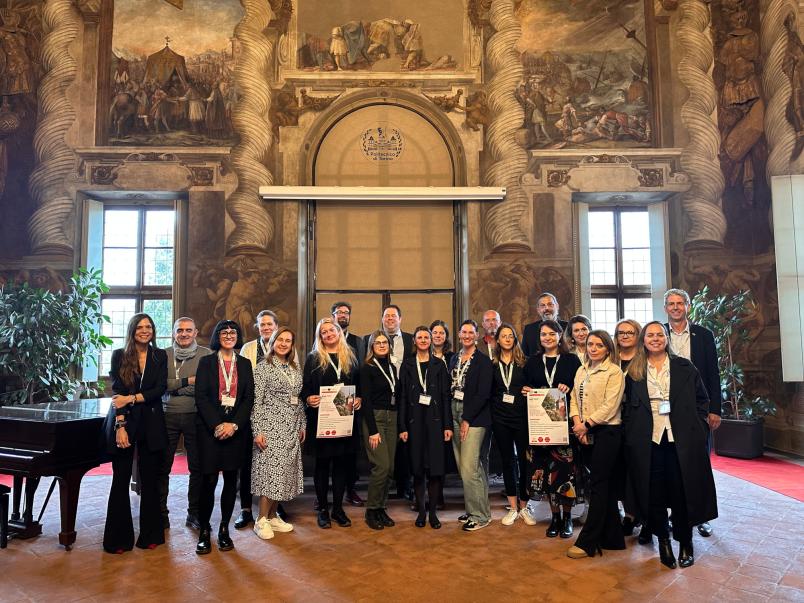New Life for Religious Heritage in European Rural Areas

Sharing is the key word. It enables more effective action at the local level, fosters social and economic value, and ensures the careful conservation and enhancement of local artistic heritage. This is the spirit of REliHE (Religious Heritage in Rural Areas), an Interreg Europe project launched approximately one year ago. Coordinated and supported by Politecnico di Torino, it involves selected rural areas across six European countries. Participants in REliHE share best practices for enhancing rural religious heritage, thereby acquiring new skills and improving their capacity for action. Although still in progress, the project is already proving to be a model worth replicating.
Chiara Maria Lucia Occelli, Professor at Department of Architecture and Design-DAD at Politecnico di Torino, explains: “Religious heritage is a vital part of the European rural landscape, yet it is often underutilised, if not abandoned and in decay. Across Europe, however, there are examples of management and enhancement strategies in place, though they are limited to certain areas. Sharing and disseminating such experiences may be the right way forward to reuse sites that hold not only historical and artistic importance, but also social, cultural, and economic significance”.
Enhancing religious heritage is closely tied to collective memory and the distributed cultural fabric it represents. This memory can guide the development of new solutions that extend beyond individual buildings. A systemic approach requires attentive, multi-level governance, often coordinated by supra-local bodies. Several challenges must be addressed: from ownership and restoration issues to the lack of sustainable reuse strategies, and broader conservation concerns.
This broader context is precisely what REliHE aims to address, by revitalising religious heritage in rural areas through the collection and sharing of existing initiatives and by encouraging the development of new ideas.
The project brings together partners from the Province of Overijssel (Netherlands), the Province of Zaragoza (Spain), the Kujawsko-Pomorskie Voivodeship (Poland), the Upper Palatinate (Germany), the South Bohemia (Czech Republic) and Zemgale (Latvia). Three key objectives underpin this collaboration: the development of new approaches for strategic reuse, improved governance of heritage at the regional level, and the promotion of an attitude that supports structural change. Ultimately, the goal is to integrate religious heritage enhancement into broader local development strategies.
Irene Ruiz Bazan, Researcher at DAD, highlights the value of the methodology: “The lasting innovation of Interreg, which aligns perfectly with REliHE, is capacity building, which is the ability to foster a new culture by sharing knowledge and policies across territories. The core idea is that all participants are mutually inspired by best practices. Each country has specific policies for these heritage assets, which could prove valuable in other contexts as well”. The focus on local development even transcends the religious differences among partner countries.
On the role of Politecnico di Torino and the distinctive features of REliHE, Isabel Soria de Irisarri, technical coordinator of the project for the Province of Zaragoza, comments: “Through REliHE, we are focusing on several pressing territorial challenges, such as the widespread abandonment and disuse of religious buildings, which require sustainable reuse and co-functionality strategies. Despite the significant investments in heritage made by the institution over the past forty years, depopulation and the decline in religious vocations have left many sites unused, prompting the need for new models. Added to this are complex ownership situations and regulatory constraints, which require strong public-private partnerships to ensure sustainable conservation, a goal the institution hopes to advance through its participation in the project.”. Soria also emphasises the crucial contribution of Politecnico: “Politecnico serves as an essential point of reference, not only in defining the overall objectives of the project and ensuring its operational coordination, but also in the concrete support it provides to each partner for the local implementation of activities, tailoring them to regional policies and territorial specificities”.
The project began in April 2024 and will conclude at the end of June 2028. It is organised into six-month phases, each dedicated to a specific theme. These topics form the basis for exchanges, online events, and site visits involving project partners and external stakeholders, who can contribute meaningfully to the improvement of adopted practices.
“Our overarching aim is not merely to prevent the degradation of these assets, but to ensure their conservation and adaptive reuse in every aspect”. These goals can be achieved – as RiccardoPalma, Full Professor at DAD, points out – “through the valuable contribution of Politecnico in terms of technical, scientific, and organisational expertise, often translated into tangible tools for territorial development and growth.”.